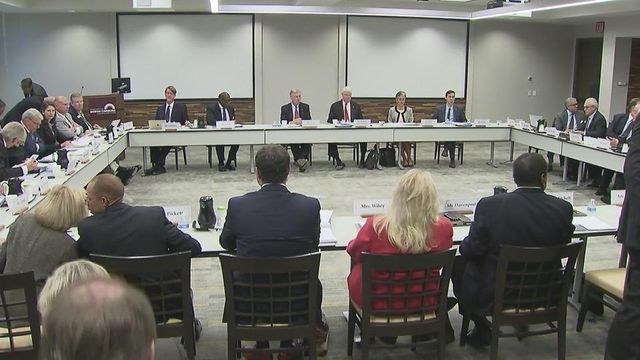UNC board skirts open meetings law
Members of the University of North Carolina Board of Governors say the group voted Friday to change the salaries of at least two chancellors in the 17-campus system but won't disclose exactly what action was taken, a stance that violates North Carolina's open meetings laws.
Board member George Sywassink mentioned the changes during a hastily delivered Personnel and Tenure Committee report Friday afternoon after the full board wrapped up a nearly five-hour meeting, much of which was spent in closed session.
Following the meeting, UNC spokeswoman Joni Worthington confirmed that the salaries in question were not ratified in open session. Rather, she said, the board "authorized the implementation of changes" in closed session. When ask to clarify if the board voted on salaries, she said, "They took action."
Worthington said she was relaying information from Thomas C. Shanahan, the UNC system's general counsel. The information in question, Worthington said, would not become public record until the individuals affected were informed and the action took effect.
That stance runs counter to how North Carolina's open meetings and open records laws require public bodies to operate, according to two lawyers who specialize in open government issues.
"If it has been voted on and they took action, it's a matter of public record," said Mike Tadych, a lawyer with Stevens, Martin, Vaughn and Tadych, who works for the North Carolina Press Association as well as a number of media companies, including WRAL News.
Tadych said there was no exception in the state's open meetings law that allows a group like the Board of Governors to take specific actions like the ones described in private.
"At the end of the day, their ultimate decision needs to be voted on in open session," he said.
Jonathan Jones, a lawyer and director of the North Carolina Open Government Coalition, concurred, saying decisions tentatively reached in closed session must be ratified in open session.
"The Board of Governors has really struggled to understand their responsibilities under the open meetings law over the past nine months," Jones said.
He cited a case two weeks ago when an "emergency meeting" was held on short notice to talk about the search for a new UNC system president and interview a candidate, Margaret Spellings. Spellings was named to the post a week after that meeting.
"The emergency meeting they held was clearly not an emergency meeting," Jones said.
That meeting also was problematic because it did not adjourn in open session and was held in a building on the SAS Institute campus that locked down after 5 p.m. when the meeting ended up running past that time.
Earlier this year, when meeting in Charlotte, the board dealt with a disruptive audience member by moving the meeting to a room so small that most members of the public could not attend in person. They did provide a live feed of that meeting, but Jones said, in his view, the move ran afoul of the open meetings laws.
Individually and taken together, those actions raise "serious questions," he said.
Worthington said the information in question would be released as soon as the system deemed it to be public, but she said that would not be Friday.











